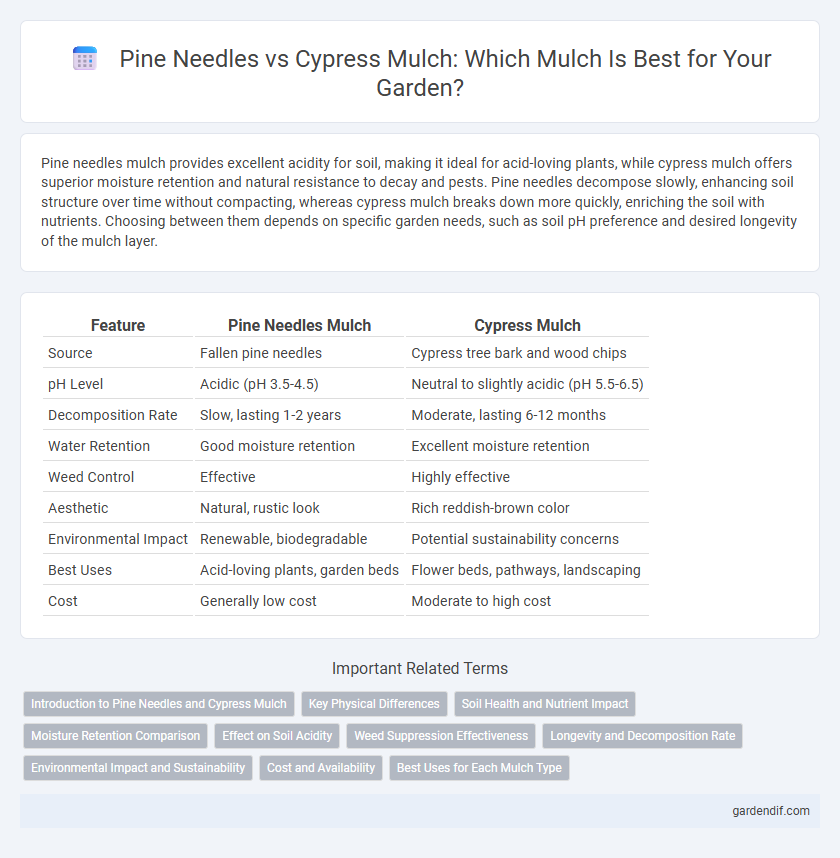
Pine needles vs Cypress mulch Illustration
Pine needles mulch provides excellent acidity for soil, making it ideal for acid-loving plants, while cypress mulch offers superior moisture retention and natural resistance to decay and pests. Pine needles decompose slowly, enhancing soil structure over time without compacting, whereas cypress mulch breaks down more quickly, enriching the soil with nutrients. Choosing between them depends on specific garden needs, such as soil pH preference and desired longevity of the mulch layer.
Table of Comparison
| Feature | Pine Needles Mulch | Cypress Mulch |
|---|---|---|
| Source | Fallen pine needles | Cypress tree bark and wood chips |
| pH Level | Acidic (pH 3.5-4.5) | Neutral to slightly acidic (pH 5.5-6.5) |
| Decomposition Rate | Slow, lasting 1-2 years | Moderate, lasting 6-12 months |
| Water Retention | Good moisture retention | Excellent moisture retention |
| Weed Control | Effective | Highly effective |
| Aesthetic | Natural, rustic look | Rich reddish-brown color |
| Environmental Impact | Renewable, biodegradable | Potential sustainability concerns |
| Best Uses | Acid-loving plants, garden beds | Flower beds, pathways, landscaping |
| Cost | Generally low cost | Moderate to high cost |
Introduction to Pine Needles and Cypress Mulch
Pine needles mulch, known for its lightweight and acidic properties, enhances soil drainage and gradually lowers pH, making it ideal for acid-loving plants. Cypress mulch, derived from durable cypress wood, offers long-lasting moisture retention and resistance to decay, supporting healthy plant growth. Both mulches improve soil structure but differ in texture, decomposition rate, and ideal garden applications.
Key Physical Differences
Pine needles mulch is lightweight, acidic, and slow to decompose, making it ideal for acid-loving plants and improving soil aeration. Cypress mulch is denser, has natural insect-repellent properties, and breaks down more slowly, providing long-lasting weed control and moisture retention. The choice between pine needles and cypress mulch depends on soil pH preferences, pest management needs, and desired mulch longevity.
Soil Health and Nutrient Impact
Pine needle mulch acidifies soil slightly, promoting nutrient absorption for acid-loving plants, while cypress mulch decomposes slower, providing long-term soil insulation and moisture retention. The acidic nature of pine needles improves microbial activity beneficial for organic matter breakdown, enhancing nutrient cycling rates. Cypress mulch supports nutrient conservation by minimizing leaching and suppressing weeds, which compete for soil nutrients, ultimately sustaining soil health.
Moisture Retention Comparison
Pine needles mulch provides excellent moisture retention due to its lightweight structure, allowing water to penetrate while reducing evaporation and maintaining consistent soil hydration. Cypress mulch offers superior moisture retention by forming a dense layer that minimizes water loss and insulates the soil from temperature fluctuations. When comparing moisture retention, cypress mulch generally outperforms pine needles by creating a more effective barrier against dryness, making it ideal for plants requiring steady moisture levels.
Effect on Soil Acidity
Pine needles mulch significantly lowers soil pH, increasing acidity due to its high lignin and resin content, which releases acidic compounds as it decomposes. Cypress mulch has a more neutral effect on soil acidity, making it suitable for plants needing balanced pH levels. Choosing between pine needles and cypress mulch depends on the desired soil pH adjustment for specific garden plants.
Weed Suppression Effectiveness
Pine needle mulch provides moderate weed suppression due to its lightweight structure, which allows some weed seeds to penetrate and germinate, whereas cypress mulch offers superior weed control with its dense texture and slower decomposition rate that effectively blocks sunlight and inhibits weed growth. The natural acidity of pine needles can also slightly limit certain weed species but is less consistent compared to the physical barrier created by cypress mulch. Studies show cypress mulch can reduce weed emergence by up to 70%, outperforming pine needles in maintaining long-term weed suppression.
Longevity and Decomposition Rate
Pine needle mulch typically lasts longer than cypress mulch due to its slower decomposition rate, which helps maintain soil coverage for extended periods. Cypress mulch breaks down more rapidly, enriching the soil faster but requiring more frequent replenishment. Choosing between pine needles and cypress mulch depends on the desired balance between longevity and nutrient release speed in garden maintenance.
Environmental Impact and Sustainability
Pine needle mulch decomposes slowly, improving soil acidity and reducing erosion while supporting local biodiversity, making it a sustainable choice for acidic soil environments. Cypress mulch, derived from cypress trees, has a higher nutrient content but raises sustainability concerns due to habitat disruption and slower regrowth rates in cypress ecosystems. Choosing pine needle mulch promotes better environmental impact by balancing soil health improvement with lower ecological footprint compared to cypress mulch.
Cost and Availability
Pine needle mulch generally costs less and is more readily available in regions with abundant pine forests, offering an economical option for large garden areas. Cypress mulch tends to be more expensive due to limited supply and higher demand, especially in areas where cypress trees are less common. Both mulches provide excellent weed suppression and moisture retention, but cost and local availability often guide the choice between them.
Best Uses for Each Mulch Type
Pine needle mulch excels in acidifying soil and is ideal for acid-loving plants like blueberries, azaleas, and rhododendrons, providing excellent moisture retention and weed suppression. Cypress mulch, known for its durability and slow decomposition, is best suited for high-traffic areas, pathways, and around trees or shrubs where long-lasting coverage is desired. Both mulches improve soil structure but must be chosen based on plant type and landscape needs for optimal results.
Pine needles vs Cypress mulch Infographic

 gardendif.com
gardendif.com